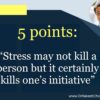Accumulative stress, even if it doesn’t lead to a sudden, fatal event, can severely cripple an individual’s drive, passion, and ability to act. It’s a silent assassin of ambition, slowly eroding the very qualities that fuel success and personal fulfillment.
Here are 5 points why stress may not kill a person, but it certainly kills one’s initiative:
1. It Leads to Decision Paralysis and Overwhelm
When under accumulative stress, the brain’s prefrontal cortex (responsible for executive functions like decision-making, planning, and problem-solving) becomes impaired. Individuals feel constantly overwhelmed by tasks, even small ones. This leads to analysis paralysis, where they overthink options, fear making the “wrong” choice, and ultimately make no choice at all. The sheer mental effort required to initiate anything feels insurmountable, leading to inaction and a complete loss of initiative.
2. It Drains Motivation and the Drive to Start
Stress activates the body’s survival mechanisms, prioritizing immediate threat response over long-term goals. Hormonal imbalances, particularly impacting dopamine (linked to reward and motivation), make it harder to find enjoyment or satisfaction in work. This results in a pervasive lack of motivation. The “why bother?” feeling becomes dominant, and the energy required to initiate new projects, pursue challenging goals, or even complete routine tasks simply isn’t there. The drive to start anything new or difficult evaporates.
3. It Fosters Procrastination as a Coping Mechanism
Under stress, the immediate discomfort of a demanding task often outweighs the long-term benefit of completing it. People develop a tendency to procrastinate, delaying action to avoid the negative emotions associated with the task (e.g., anxiety, fear of failure). This provides a temporary sense of relief, but compounds the stress in the long run, creating a vicious cycle. The habit of putting things off becomes ingrained, effectively killing the initiative to tackle anything head-on.
4. It Suppresses Creativity and Risk-Taking
Initiative often requires thinking outside the box and being willing to take calculated risks. Accumulative stress, however, pushes the brain into a more rigid, survival-oriented mode. It suppresses divergent thinking and inhibits creativity, making it difficult to generate new ideas or see alternative solutions. Furthermore, the heightened sense of threat makes individuals risk-averse, preferring the safety of inaction over the potential (imagined or real) negative consequences of trying something new. This kills the very spark needed for innovation and proactive steps.
5. It Erodes Self-Efficacy and Confidence
Repeated cycles of stress-induced overwhelm, procrastination, and underperformance chip away at an individual’s self-efficacy – their belief in their own ability to succeed. When initiative is constantly thwarted by stress, people start to doubt their capabilities, leading to reduced confidence. This internal belief that “I can’t do it” becomes a self-fulfilling prophecy, making them less likely to even attempt to initiate tasks or pursue ambitions, even when the actual capacity might still be there.
You can’t solve performance problems without addressing stress at the root.
That’s why I’m conducting in-house corporate workshops titled: Eradicate Stress. Elevate Performance. A one-day breakthrough experience to reset your team’s clarity, calm, and creative energy.
If you’re a CEO, an HR leader, or business head who sees these patterns — let’s talk. Contact me or visit https://drrakeshchopra.com/eradicate-stress-elevate-performance/ to bring this transformation to your organization.
– Dr Rakesh Chopra


